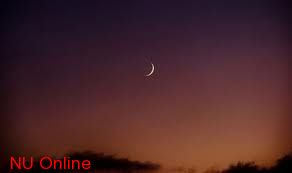Fasting is obligatory upon the sighting of the new moon
NU Online · Kamis, 11 Juli 2013 | 16:54 WIB
Fasting in Ramadhaan has been obligated upon each and every Muslim upon the sighting of the new moon. The first day of Ramadhaan begins the day following the sighting of the new moon on the 29th day of Sha’baan. If he doesn’t see the moon there then he has to complete the 30 days of Sha’ban and then start Ramdaan. And the similar case is applied when spotting the moon for the end of Ramdaan and the beginning of Eid and the month of Shawwaal. Allah says in the Quran:<>
ÙÙŽÙ…ÙŽÙ† Ø´ÙŽÙ‡Ùدَ Ù…ÙنكÙم٠الشَّهْرَ ÙَلْيَصÙمْهÙ
“… So whoever among you sights (the crescent on the first night of) the month (of Ramadaan), he must observe sawm (fast) that month…” [Surah Al Baqarah (2) V. 185]
And also Abu Hurayrah (r.a) narrated that the Prophet (sall Allâhu’ alayhi wa sallam) said “Fast when you see it [the new moon] and stop fasting when you see it, and if it is cloudy then complete the month with thirty days.” This hadeeth could have two meanings First one being that each and every Muslim must sight the moon by himself. So for each muslim if he sees the moon then he fasts and if he doesn’t then he doesn’t fast. And the second one is that the Muslim community as a whole have to sight the moon. If anyone from the Muslim community has seen the moon then it is sufficient for all of the Muslims. These are the only two meanings that this hadeeth can have. And the sunnah shows us clearly that the meaning is clearly the second one. So for a Muslim to hear the news form someone else that the moon has been sighted, this is enough for him to fast. He does not have to go out and sight the moon himself. We will see the proof for this in the next few posts.
Terpopuler
1
Khutbah Jumat: Maulid Nabi dan 4 Sifat Teladan Rasulullah bagi Para Pemimpin
2
Tata Cara Shalat Gerhana Bulan, Lengkap dengan Niat dan Surat yang Dianjurkan
3
Khutbah Jumat: Menjaga Amanah dan Istiqamah dalam Kehidupan
4
Khutbah Jumat: Merawat Keutuhan Keluarga di Era Media Sosial
5
Lusa, Umat Islam Dianjurkan Puasa Ayyamul Bidh Rabiul Awal 1447 H, Berikut Niatnya
6
Tanggapi 17+8 Tuntutan Rakyat, DPR Stop Tunjangan Rumah dan Moratorium Kunjungan ke Luar Negeri
Terkini
Lihat Semua















